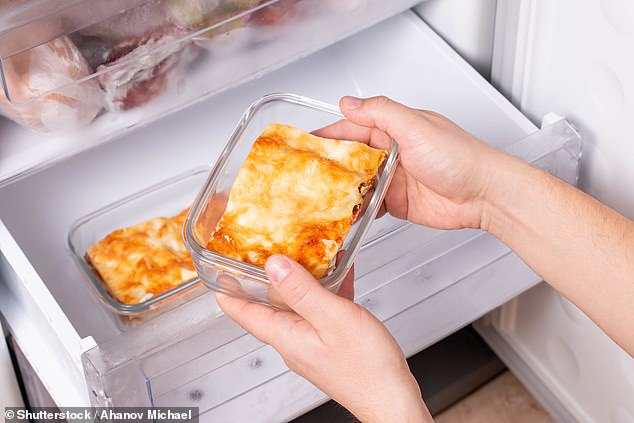After a busy day of work, many of us head straight to the freezer when it comes to a quick and easy dinner.
But be careful what you choose, as not all food can be cooked straight from frozen.
Experts from Which? have revealed the five foods you should never cook without carefully defrosting – and some of them may surprise you.
‘Freezing food is a simple and convenient way to reduce waste, maintain nutritional value and save money,’ Which? explained.
‘But not all food can be cooked straight from frozen.
‘From poultry to dairy, it can be confusing to know when you should – and shouldn’t – skip the defrosting process.
‘Our expert tips, along with trusted advice from the Food Standards Agency (FSA), will help you navigate the myths and save time in the kitchen.’
So, have you fallen victim to any of these defrosting blunders?

Experts from Which? have revealed the five foods you should never cook without carefully defrosting – and some of them may surprise you
1. Chicken
While processed chicken products like nuggets or burgers can go straight in the oven, raw chicken should never be cooked from frozen.
‘The FSA strongly advises against cooking raw chicken from frozen as it can lead to uneven cooking and bacteria growth,’ Which? explained.
‘While the outside of the chicken may heat up and appear done, the inside may remain undercooked and take longer to reach a safe temperature, creating ideal conditions for bacteria, such as campylobacter and salmonella.’
In terms of the defrosting process, you should never defrost chicken at room termperature.
Instead, it’s best to defrost it in the fridge – although this can taken 24 hours or longer, so make sure you plan your meals ahead.

While processed chicken products like nuggets or burgers can go straight in the oven, raw chicken should never be cooked from frozen
2. Sausages
Some sasusages are sold frozen and are safe to cook straight from the freezer.
However, home–frozen sasauges will always need to be fully defrosted before cooking, according to Which?.
If you’re going to cook them straight away, simply use the defrost setting in the microwave.
But if you want to defrost and cook them later, it’s best to thaw them out in the fridge.
‘Check the centres are fully thawed before you start cooking,’ the consumer champion advises.
3. Mince
It’s a handy ingredient to keep in the fridge, whether it’s for a lasagna or a chilli con carne.
However, mince should always be defrosted before cooking.
‘Blocks of mince are dense, which can result in an unevenly cooked meal if they’re not defrosted first,’ Which? explained.

It’s a handy ingredient to keep in the fridge, whether it’s for a lasagna or a chilli con carne. However, mince should always be defrosted before cooking
‘Like chicken and sausages, some mince may remain undercooked, increasing your risk of food poisoning.’
4. Prawns or shellfish
Like sausages, there are some packs of frozen prawns specifically prepared to be cooked straight from the freezer.
However, in most cases, prawns and other types of shellfish should be defrosted before cooking.
‘Cooking prawns straight from frozen, without following the tested instructions, can lead to the outsides becoming tough and overcooked, while the centres remain cold,’ Which? said.
‘This can increase the risk of harmful bacteria surviving.’
For the best results, thaw your prawns in the fridge overnight, or use the microwave’s defrost setting if you’re cooking them immediately.
5. Homemade frozen meals
Batch cooking and freezing meals is quick, easy, and saves both time and money.
However, there’s a risk that large, dense portions of homemade meals can cook unevenly from frozen.
This is especially the case for layered dishes containing dairy producs or minced meat – including lasagne or cottage pie.
The FSA says: ‘With homemade meals, it’s important to check food is fully cooked and steaming hot the whole way through.’
This article was originally published by a www.dailymail.co.uk . Read the Original article here. .

